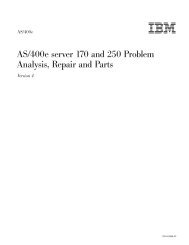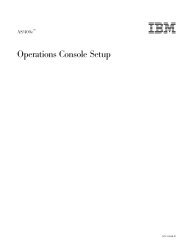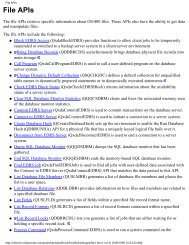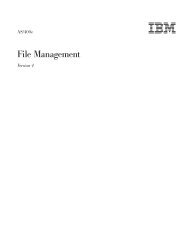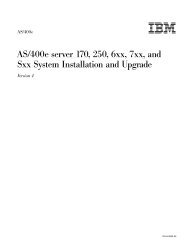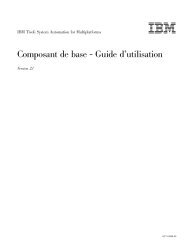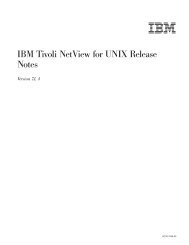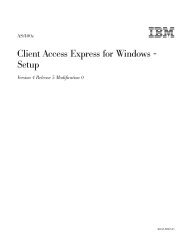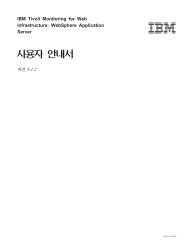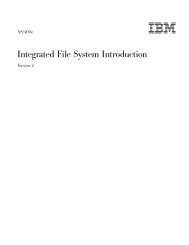Qshell Interpreter (qsh) - FTP Directory Listing - IBM
Qshell Interpreter (qsh) - FTP Directory Listing - IBM
Qshell Interpreter (qsh) - FTP Directory Listing - IBM
Create successful ePaper yourself
Turn your PDF publications into a flip-book with our unique Google optimized e-Paper software.
Options<br />
Operands<br />
Exit status<br />
Examples<br />
v -r file True if file exists and is readable.<br />
v -s file True if file exists and has a size greater than zero.<br />
v -S file True if file exists and is a socket.<br />
v -t fd True if file descriptor fd is open and associated with a terminal.<br />
v -u file True if file exists and its set user id flag is set.<br />
v -w file True if file exists and is writable.<br />
v -x file True if file exists and is executable. This only means that the execute bit is<br />
on. If file is a directory, the directory can be searched.<br />
v -z string True if the length of string is zero.<br />
v n1 -eq n2 True if the integers are equal.<br />
v n1 -ne n2 True if the integers are not equal.<br />
v n1 -gt n2 True if the first integer is greater than the second integer.<br />
v n1 -ge n2 True if the first integer is greater than or equal to the second integer.<br />
v n1 -ltn2 True if the first integer is less than the second integer.<br />
v n1 -le n2 True if the first integer is less than or equal to the second integer.<br />
v string True if string is not the null string.<br />
v string1 = string2 True if the strings are identical.<br />
v string1 != string2 True if the strings are not identical.<br />
The above primaries can be combined to form complex expressions using the<br />
following operators:<br />
v ! expr True if expr is false.<br />
v expr1 -a expr2 True if both expressions are true.<br />
v expr1 & expr2 True if both expressions are true.<br />
v expr1 -o expr2 True if either expression is true.<br />
v expr1 | expr2 True if either expression is true.<br />
v (expr) Parentheses are for grouping.<br />
The -a and & operators have higher precedence than the -o and | operators.<br />
See above.<br />
All operators and flags are separate arguments.<br />
v 0 when expression is true.<br />
v 1 when expression is false.<br />
v >1 when there is an error.<br />
1. See if /home is a directory: test -d /home<br />
2. See if one integer is less than or equal to another: test“$index” -le “$count”<br />
3. See if two strings are equal: test“$REPLY” = “Yes”<br />
Chapter 4. Utilities 103




